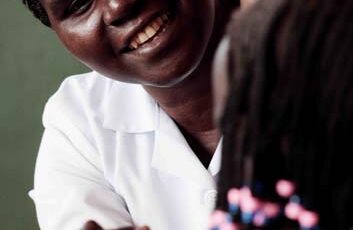THE DEPARTMENT
Our department is the largest paediatric ward in northern Uganda, with 105 beds, and is responsible for the provision of the majority of primary healthcare services for children. It is the national centre in Uganda for a range of specialties including children’s childhood cancers. We have provided quality child health services that have enabled thousands of vulnerable and unprivileged children opportunities of survival.
We admit children from birth up to 15 years of age and up to 17 years of age for children with cancers.
Pathologies and conditions treated in the department
The common conditions treated in the department include, but are not limited to:
- Malaria
- Acute respiratory tract infections – pneumonia, pharyngitis/tonsillitis, otitis media
- Diarrhoea
- Severe anaemia
- Neonatal and new-born conditions – neonatal sepsis, neonatal meningitis, perinatal asphyxia, prematurity and related complications
- Severe acute malnutrition
- Septicaemia
- Sickle cell anaemia
- Childhood malignancies
- Childhood tuberculosis
- Other conditions – renal diseases, cardiac failure, childhood diabetes
The department first began in the 60s and was specifically designed to care for and treat sick children. Bed accommodation is currently 106 beds and cots, including 10 In the Intensive Care Unit (ICU).
Children and young people attending the Day Care Surgery generally go-home on the same day following their surgery, investigations or treatment. Should the need arise they are admitted to the inpatient wards.
The Paediatric Emergency Department is operative seven days a week, twenty four hours a day.
The Children’s Outpatient Department called The Young Child Clinic is open seven days a week.
We hold seven general paediatric clinics every week. In addition, there is a Rapid Access clinic held three times a week in the Paediatric Emergency Department, where children who need more urgent assessment can be seen by a consultant.
We deliver Paediatric care with a specialist team including paediatric surgeons and paediatric anaesthetists, along with a dedicated team of qualified paediatric nurses.
- We offer general and specialized services to children 15 years and below, as well as those aged up to 17 years with cancer.
- Neonatal services for premature babies with a novel innovation that uses a pre-heated room serving as one big incubator, for temperature regulation.
- Nutritional rehabilitation and management of patients with severe acute malnutrition
- Emergency care services
- Acute and long term management of children with sickle cell disease
- Management of common childhood malignancies, especially Burkitt lymphoma and other non-Hodgkin lymphoma, Nephroblastoma, etc
- Immunization services both within the hospital and through outreach programmes, in the territory
Special Care – Sickle cell
Sicle cell disease is a group of disorders which affects red blood cells and inhibits their ability to transfer oxygen to the body. Acute anaemia , swelling of hands and feet and episodes of pain are some of the symptoms of this disorder. Most children are diagnosed when they are about four to six months old and will receive follow-up treatment and care in our department into adulthood. We also have a day unit for children who need regular blood transfusions.
Our service works closely with our paediatric surgeons and colleagues in the intensive care wards. We monitor children regularly using blood and urine tests, which help us identify those patients at risk of a stroke.
We also offer a counselling service to help children with their emotional problems or psychological difficulties.
Policy
- 24 hour coverage by clinicians and nurses, working 7 days a week
- We always attend to all patients who come to hospital regardless of time and space
- We use a triage system to take care of the critically ill patients and emergency cases first given the high patient load
- We put emphasis on quality and the provision of services with compassion.
Training
- The department is involved in the teaching of medical personnel. Undergraduate students from Gulu University and our own Schools of Nursing and Midwifery receive training in Paediatrics at St Mary’s.
Meeting challenges and Plans for the Future
- Late presentation and referral of patients severely hinders the patients’ chances of a speedy and good recovery. The department is coordinating, on an on-going basis, an awareness campaign through the peripheral Health Centres.
- We have already added a second Nursery unit for the management of premature babies and we are planning a new Neonatal unit which will be situated between Maternity and the Children’s Ward.
Services
- Paediatric endocrinology
- Paediatric gastroenterology and nutrition
- Paediatric haematology
- Paediatric orthopaedics
- Paediatric respiratory
- Paediatric sickle cell
- Paediatric surgery
- Paediatrics, general




